Applying the Law: Business Law in the UK (Sales of Goods & Services)
VerifiedAdded on 2020/10/05
|8
|2612
|346
Report
AI Summary
This report examines the application of UK business law to sales of goods and services, focusing on a case study involving a faulty television. It analyzes the relevant statutory provisions, including the Sales of Goods Act 1979, the Consumer Rights Act 2015, and the Consumer Protection Act 1987, to advise a customer (Mr. John) on his rights and potential remedies. The report covers issues such as product quality, breach of contract, transfer of property, and product liability. It explores remedies available to both buyers and sellers, including repair, replacement, refund, and compensation. The analysis extends to the legal implications of faulty products and the responsibilities of both the seller and the engineer who installed the product. The report concludes with a summary of the key legal principles and their application to the given scenario, offering guidance on how Mr. John can seek redress for the faulty product, providing a comprehensive overview of consumer protection within the UK legal framework.
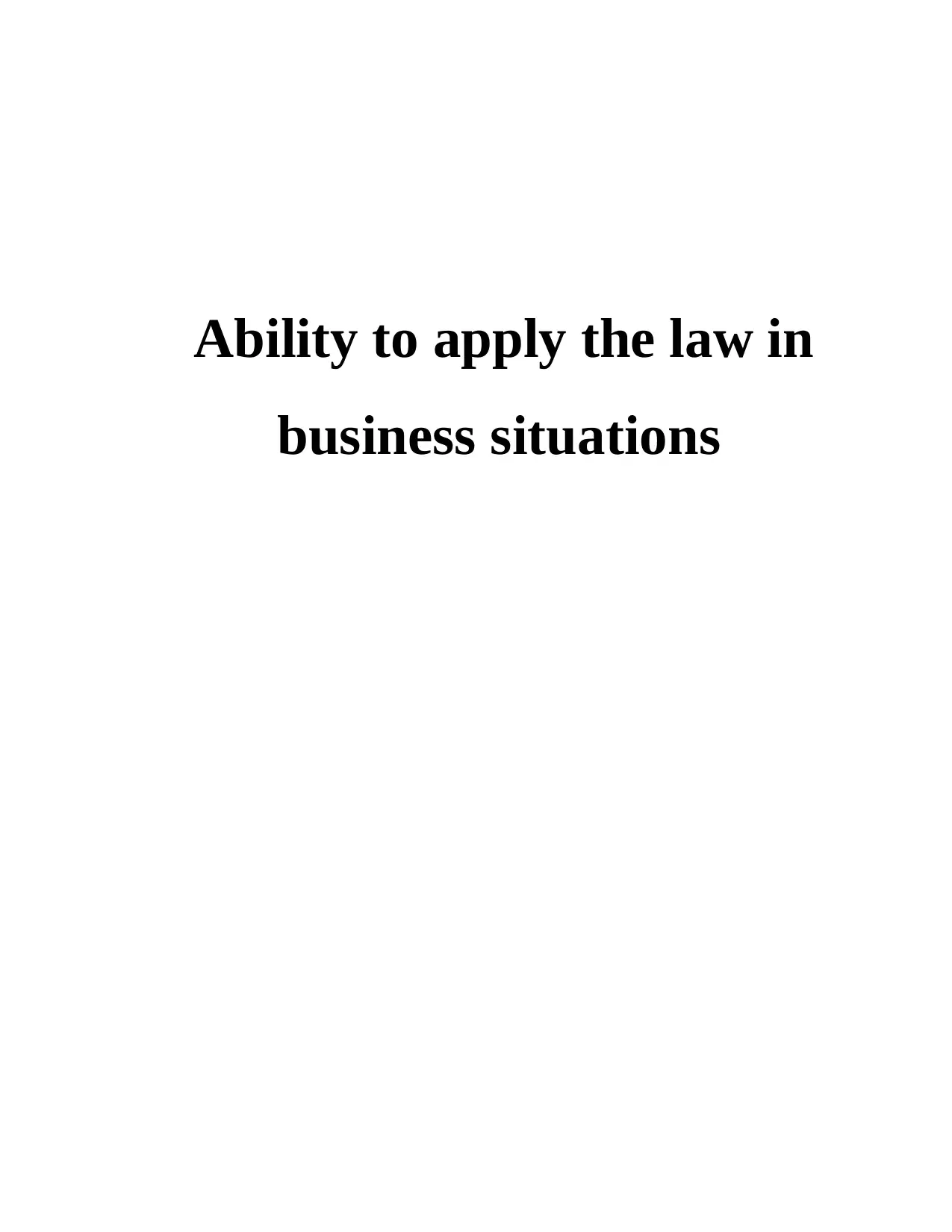
Ability to apply the law in
business situations
business situations
Paraphrase This Document
Need a fresh take? Get an instant paraphrase of this document with our AI Paraphraser
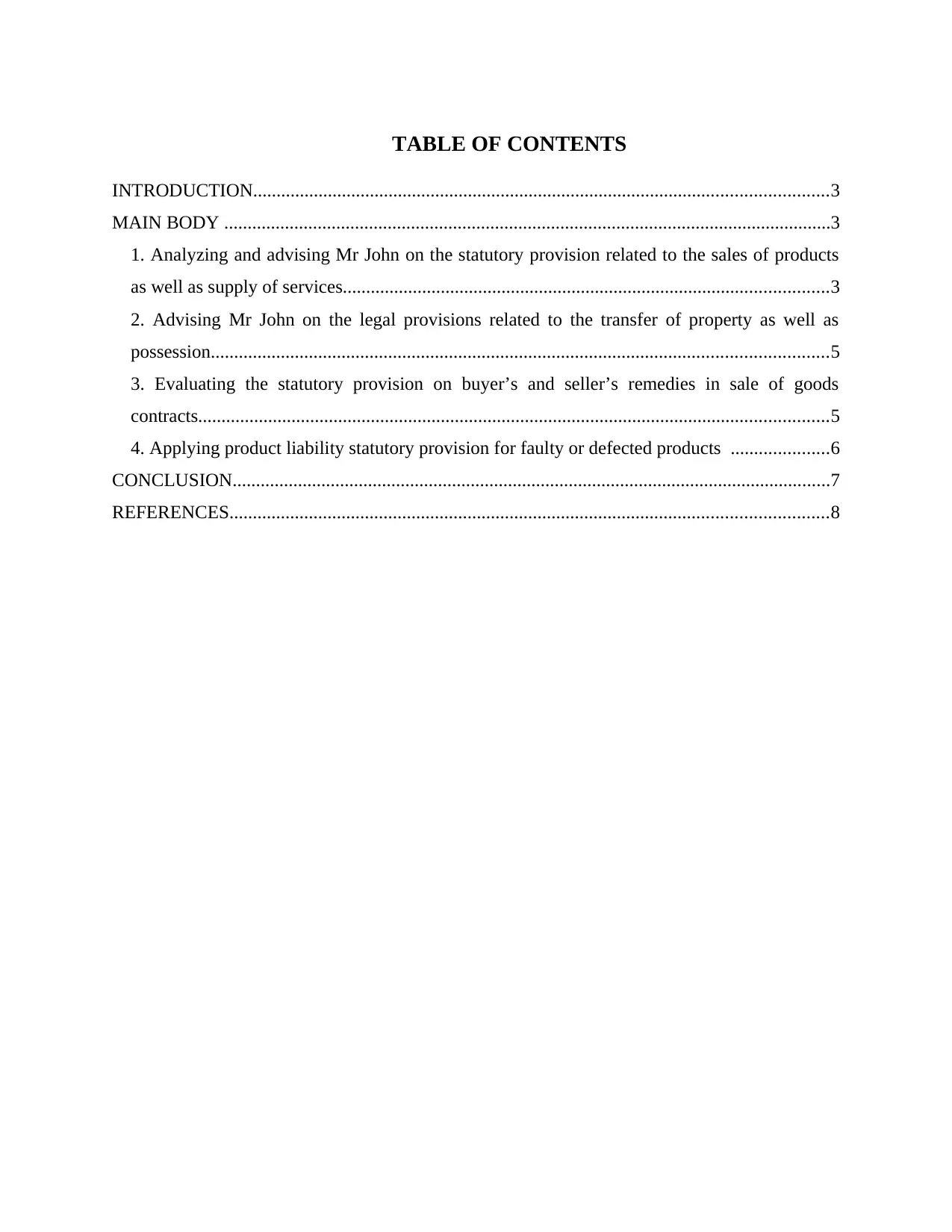
TABLE OF CONTENTS
INTRODUCTION...........................................................................................................................3
MAIN BODY ..................................................................................................................................3
1. Analyzing and advising Mr John on the statutory provision related to the sales of products
as well as supply of services........................................................................................................3
2. Advising Mr John on the legal provisions related to the transfer of property as well as
possession....................................................................................................................................5
3. Evaluating the statutory provision on buyer’s and seller’s remedies in sale of goods
contracts.......................................................................................................................................5
4. Applying product liability statutory provision for faulty or defected products .....................6
CONCLUSION................................................................................................................................7
REFERENCES................................................................................................................................8
INTRODUCTION...........................................................................................................................3
MAIN BODY ..................................................................................................................................3
1. Analyzing and advising Mr John on the statutory provision related to the sales of products
as well as supply of services........................................................................................................3
2. Advising Mr John on the legal provisions related to the transfer of property as well as
possession....................................................................................................................................5
3. Evaluating the statutory provision on buyer’s and seller’s remedies in sale of goods
contracts.......................................................................................................................................5
4. Applying product liability statutory provision for faulty or defected products .....................6
CONCLUSION................................................................................................................................7
REFERENCES................................................................................................................................8
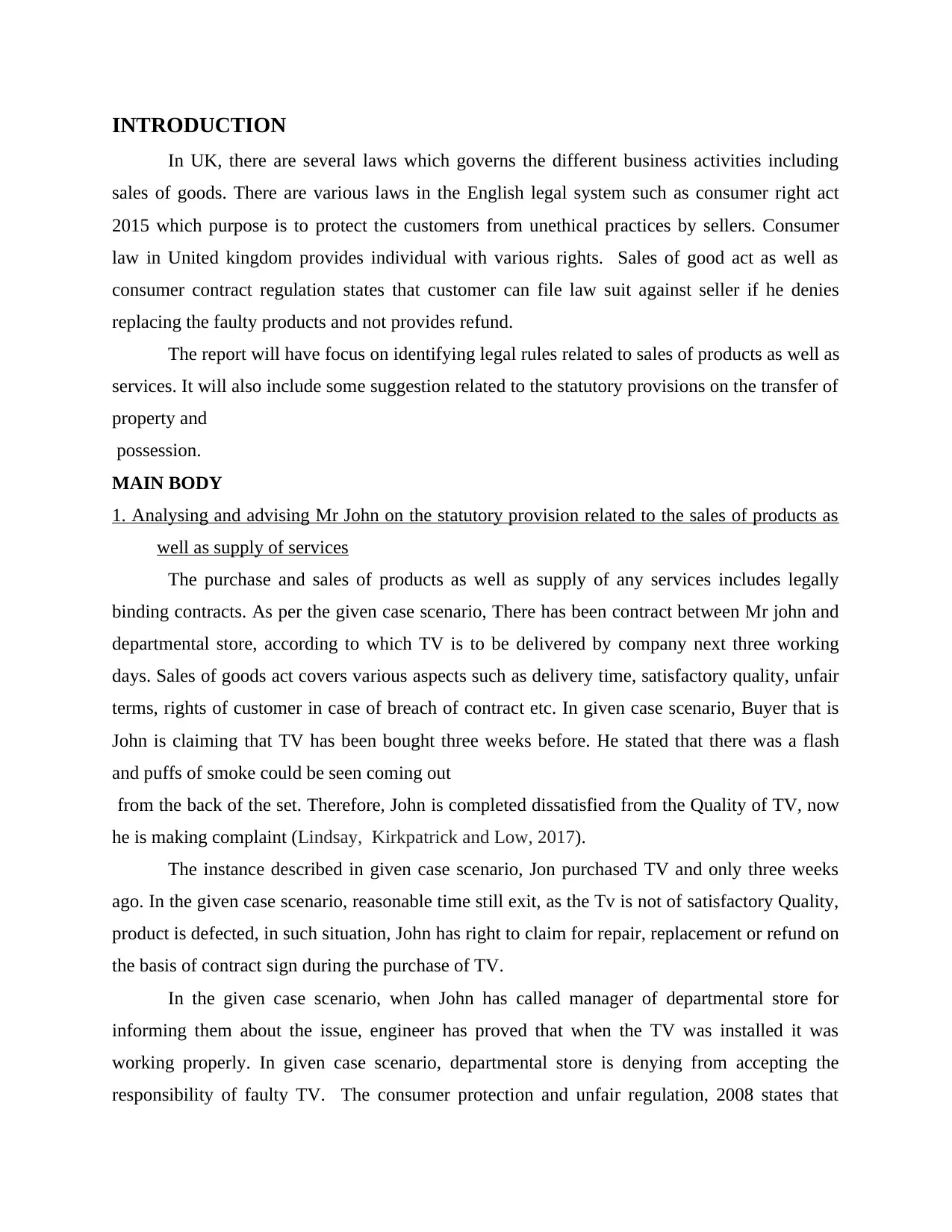
INTRODUCTION
In UK, there are several laws which governs the different business activities including
sales of goods. There are various laws in the English legal system such as consumer right act
2015 which purpose is to protect the customers from unethical practices by sellers. Consumer
law in United kingdom provides individual with various rights. Sales of good act as well as
consumer contract regulation states that customer can file law suit against seller if he denies
replacing the faulty products and not provides refund.
The report will have focus on identifying legal rules related to sales of products as well as
services. It will also include some suggestion related to the statutory provisions on the transfer of
property and
possession.
MAIN BODY
1. Analysing and advising Mr John on the statutory provision related to the sales of products as
well as supply of services
The purchase and sales of products as well as supply of any services includes legally
binding contracts. As per the given case scenario, There has been contract between Mr john and
departmental store, according to which TV is to be delivered by company next three working
days. Sales of goods act covers various aspects such as delivery time, satisfactory quality, unfair
terms, rights of customer in case of breach of contract etc. In given case scenario, Buyer that is
John is claiming that TV has been bought three weeks before. He stated that there was a flash
and puffs of smoke could be seen coming out
from the back of the set. Therefore, John is completed dissatisfied from the Quality of TV, now
he is making complaint (Lindsay, Kirkpatrick and Low, 2017).
The instance described in given case scenario, Jon purchased TV and only three weeks
ago. In the given case scenario, reasonable time still exit, as the Tv is not of satisfactory Quality,
product is defected, in such situation, John has right to claim for repair, replacement or refund on
the basis of contract sign during the purchase of TV.
In the given case scenario, when John has called manager of departmental store for
informing them about the issue, engineer has proved that when the TV was installed it was
working properly. In given case scenario, departmental store is denying from accepting the
responsibility of faulty TV. The consumer protection and unfair regulation, 2008 states that
In UK, there are several laws which governs the different business activities including
sales of goods. There are various laws in the English legal system such as consumer right act
2015 which purpose is to protect the customers from unethical practices by sellers. Consumer
law in United kingdom provides individual with various rights. Sales of good act as well as
consumer contract regulation states that customer can file law suit against seller if he denies
replacing the faulty products and not provides refund.
The report will have focus on identifying legal rules related to sales of products as well as
services. It will also include some suggestion related to the statutory provisions on the transfer of
property and
possession.
MAIN BODY
1. Analysing and advising Mr John on the statutory provision related to the sales of products as
well as supply of services
The purchase and sales of products as well as supply of any services includes legally
binding contracts. As per the given case scenario, There has been contract between Mr john and
departmental store, according to which TV is to be delivered by company next three working
days. Sales of goods act covers various aspects such as delivery time, satisfactory quality, unfair
terms, rights of customer in case of breach of contract etc. In given case scenario, Buyer that is
John is claiming that TV has been bought three weeks before. He stated that there was a flash
and puffs of smoke could be seen coming out
from the back of the set. Therefore, John is completed dissatisfied from the Quality of TV, now
he is making complaint (Lindsay, Kirkpatrick and Low, 2017).
The instance described in given case scenario, Jon purchased TV and only three weeks
ago. In the given case scenario, reasonable time still exit, as the Tv is not of satisfactory Quality,
product is defected, in such situation, John has right to claim for repair, replacement or refund on
the basis of contract sign during the purchase of TV.
In the given case scenario, when John has called manager of departmental store for
informing them about the issue, engineer has proved that when the TV was installed it was
working properly. In given case scenario, departmental store is denying from accepting the
responsibility of faulty TV. The consumer protection and unfair regulation, 2008 states that
⊘ This is a preview!⊘
Do you want full access?
Subscribe today to unlock all pages.

Trusted by 1+ million students worldwide
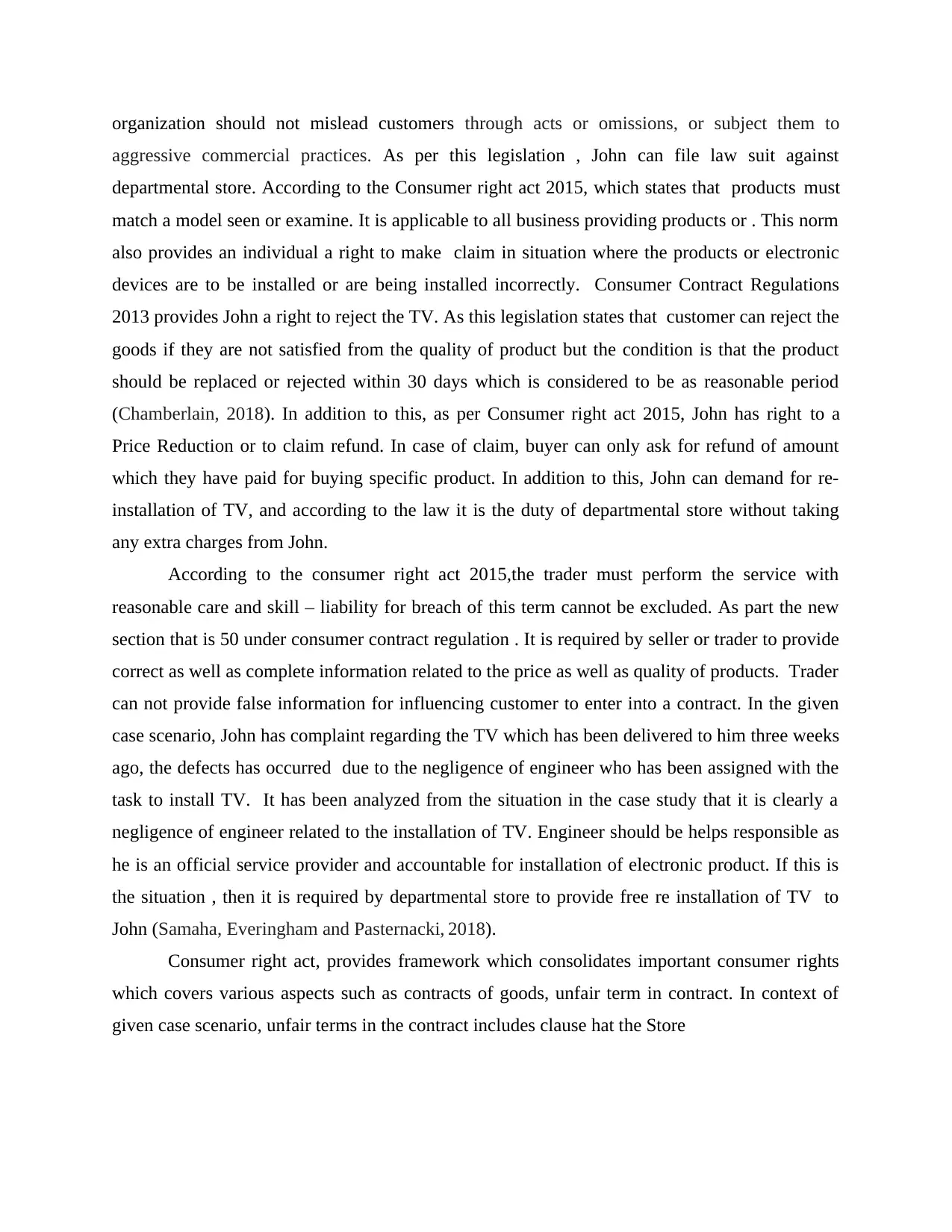
organization should not mislead customers through acts or omissions, or subject them to
aggressive commercial practices. As per this legislation , John can file law suit against
departmental store. According to the Consumer right act 2015, which states that products must
match a model seen or examine. It is applicable to all business providing products or . This norm
also provides an individual a right to make claim in situation where the products or electronic
devices are to be installed or are being installed incorrectly. Consumer Contract Regulations
2013 provides John a right to reject the TV. As this legislation states that customer can reject the
goods if they are not satisfied from the quality of product but the condition is that the product
should be replaced or rejected within 30 days which is considered to be as reasonable period
(Chamberlain, 2018). In addition to this, as per Consumer right act 2015, John has right to a
Price Reduction or to claim refund. In case of claim, buyer can only ask for refund of amount
which they have paid for buying specific product. In addition to this, John can demand for re-
installation of TV, and according to the law it is the duty of departmental store without taking
any extra charges from John.
According to the consumer right act 2015,the trader must perform the service with
reasonable care and skill – liability for breach of this term cannot be excluded. As part the new
section that is 50 under consumer contract regulation . It is required by seller or trader to provide
correct as well as complete information related to the price as well as quality of products. Trader
can not provide false information for influencing customer to enter into a contract. In the given
case scenario, John has complaint regarding the TV which has been delivered to him three weeks
ago, the defects has occurred due to the negligence of engineer who has been assigned with the
task to install TV. It has been analyzed from the situation in the case study that it is clearly a
negligence of engineer related to the installation of TV. Engineer should be helps responsible as
he is an official service provider and accountable for installation of electronic product. If this is
the situation , then it is required by departmental store to provide free re installation of TV to
John (Samaha, Everingham and Pasternacki, 2018).
Consumer right act, provides framework which consolidates important consumer rights
which covers various aspects such as contracts of goods, unfair term in contract. In context of
given case scenario, unfair terms in the contract includes clause hat the Store
aggressive commercial practices. As per this legislation , John can file law suit against
departmental store. According to the Consumer right act 2015, which states that products must
match a model seen or examine. It is applicable to all business providing products or . This norm
also provides an individual a right to make claim in situation where the products or electronic
devices are to be installed or are being installed incorrectly. Consumer Contract Regulations
2013 provides John a right to reject the TV. As this legislation states that customer can reject the
goods if they are not satisfied from the quality of product but the condition is that the product
should be replaced or rejected within 30 days which is considered to be as reasonable period
(Chamberlain, 2018). In addition to this, as per Consumer right act 2015, John has right to a
Price Reduction or to claim refund. In case of claim, buyer can only ask for refund of amount
which they have paid for buying specific product. In addition to this, John can demand for re-
installation of TV, and according to the law it is the duty of departmental store without taking
any extra charges from John.
According to the consumer right act 2015,the trader must perform the service with
reasonable care and skill – liability for breach of this term cannot be excluded. As part the new
section that is 50 under consumer contract regulation . It is required by seller or trader to provide
correct as well as complete information related to the price as well as quality of products. Trader
can not provide false information for influencing customer to enter into a contract. In the given
case scenario, John has complaint regarding the TV which has been delivered to him three weeks
ago, the defects has occurred due to the negligence of engineer who has been assigned with the
task to install TV. It has been analyzed from the situation in the case study that it is clearly a
negligence of engineer related to the installation of TV. Engineer should be helps responsible as
he is an official service provider and accountable for installation of electronic product. If this is
the situation , then it is required by departmental store to provide free re installation of TV to
John (Samaha, Everingham and Pasternacki, 2018).
Consumer right act, provides framework which consolidates important consumer rights
which covers various aspects such as contracts of goods, unfair term in contract. In context of
given case scenario, unfair terms in the contract includes clause hat the Store
Paraphrase This Document
Need a fresh take? Get an instant paraphrase of this document with our AI Paraphraser
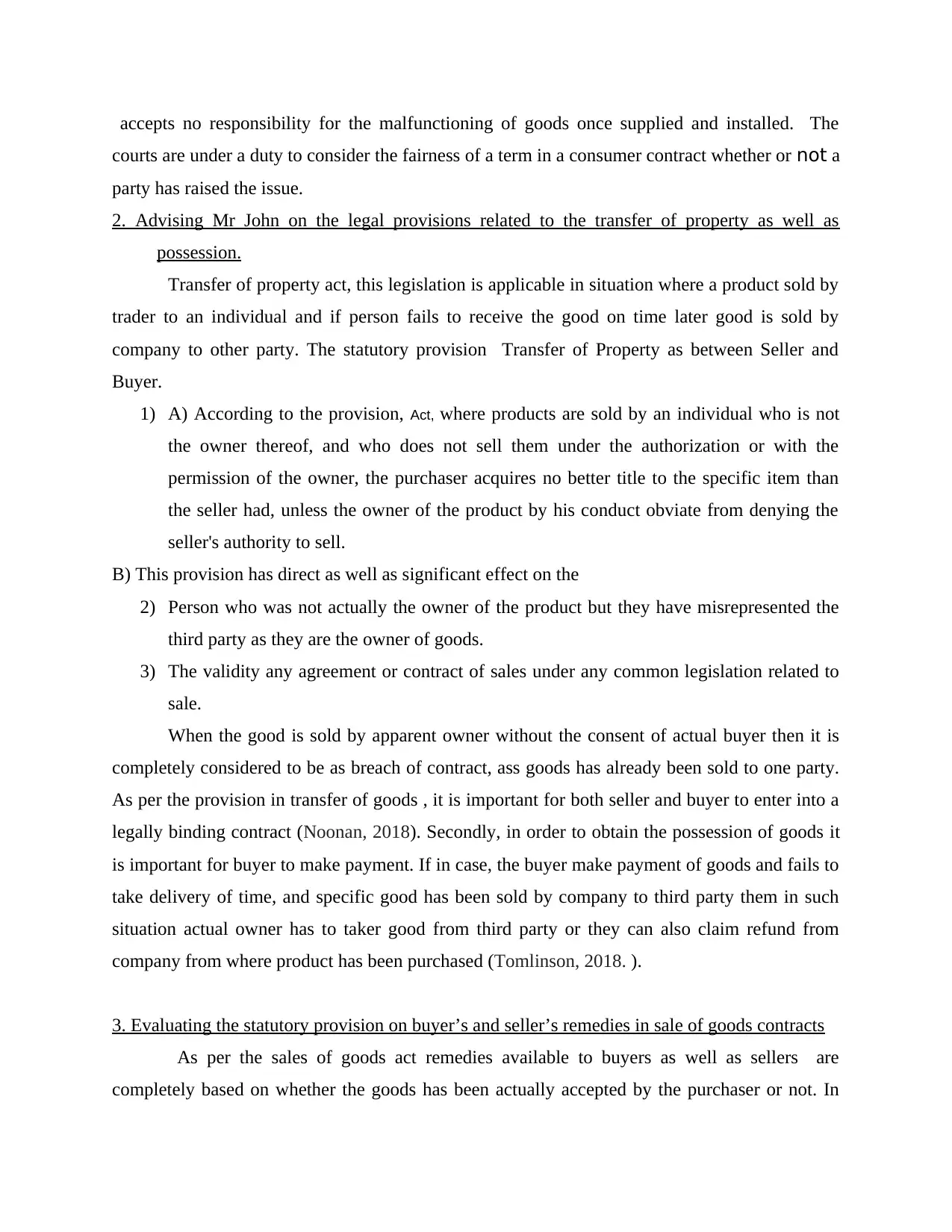
accepts no responsibility for the malfunctioning of goods once supplied and installed. The
courts are under a duty to consider the fairness of a term in a consumer contract whether or not a
party has raised the issue.
2. Advising Mr John on the legal provisions related to the transfer of property as well as
possession.
Transfer of property act, this legislation is applicable in situation where a product sold by
trader to an individual and if person fails to receive the good on time later good is sold by
company to other party. The statutory provision Transfer of Property as between Seller and
Buyer.
1) A) According to the provision, Act, where products are sold by an individual who is not
the owner thereof, and who does not sell them under the authorization or with the
permission of the owner, the purchaser acquires no better title to the specific item than
the seller had, unless the owner of the product by his conduct obviate from denying the
seller's authority to sell.
B) This provision has direct as well as significant effect on the
2) Person who was not actually the owner of the product but they have misrepresented the
third party as they are the owner of goods.
3) The validity any agreement or contract of sales under any common legislation related to
sale.
When the good is sold by apparent owner without the consent of actual buyer then it is
completely considered to be as breach of contract, ass goods has already been sold to one party.
As per the provision in transfer of goods , it is important for both seller and buyer to enter into a
legally binding contract (Noonan, 2018). Secondly, in order to obtain the possession of goods it
is important for buyer to make payment. If in case, the buyer make payment of goods and fails to
take delivery of time, and specific good has been sold by company to third party them in such
situation actual owner has to taker good from third party or they can also claim refund from
company from where product has been purchased (Tomlinson, 2018. ).
3. Evaluating the statutory provision on buyer’s and seller’s remedies in sale of goods contracts
As per the sales of goods act remedies available to buyers as well as sellers are
completely based on whether the goods has been actually accepted by the purchaser or not. In
courts are under a duty to consider the fairness of a term in a consumer contract whether or not a
party has raised the issue.
2. Advising Mr John on the legal provisions related to the transfer of property as well as
possession.
Transfer of property act, this legislation is applicable in situation where a product sold by
trader to an individual and if person fails to receive the good on time later good is sold by
company to other party. The statutory provision Transfer of Property as between Seller and
Buyer.
1) A) According to the provision, Act, where products are sold by an individual who is not
the owner thereof, and who does not sell them under the authorization or with the
permission of the owner, the purchaser acquires no better title to the specific item than
the seller had, unless the owner of the product by his conduct obviate from denying the
seller's authority to sell.
B) This provision has direct as well as significant effect on the
2) Person who was not actually the owner of the product but they have misrepresented the
third party as they are the owner of goods.
3) The validity any agreement or contract of sales under any common legislation related to
sale.
When the good is sold by apparent owner without the consent of actual buyer then it is
completely considered to be as breach of contract, ass goods has already been sold to one party.
As per the provision in transfer of goods , it is important for both seller and buyer to enter into a
legally binding contract (Noonan, 2018). Secondly, in order to obtain the possession of goods it
is important for buyer to make payment. If in case, the buyer make payment of goods and fails to
take delivery of time, and specific good has been sold by company to third party them in such
situation actual owner has to taker good from third party or they can also claim refund from
company from where product has been purchased (Tomlinson, 2018. ).
3. Evaluating the statutory provision on buyer’s and seller’s remedies in sale of goods contracts
As per the sales of goods act remedies available to buyers as well as sellers are
completely based on whether the goods has been actually accepted by the purchaser or not. In
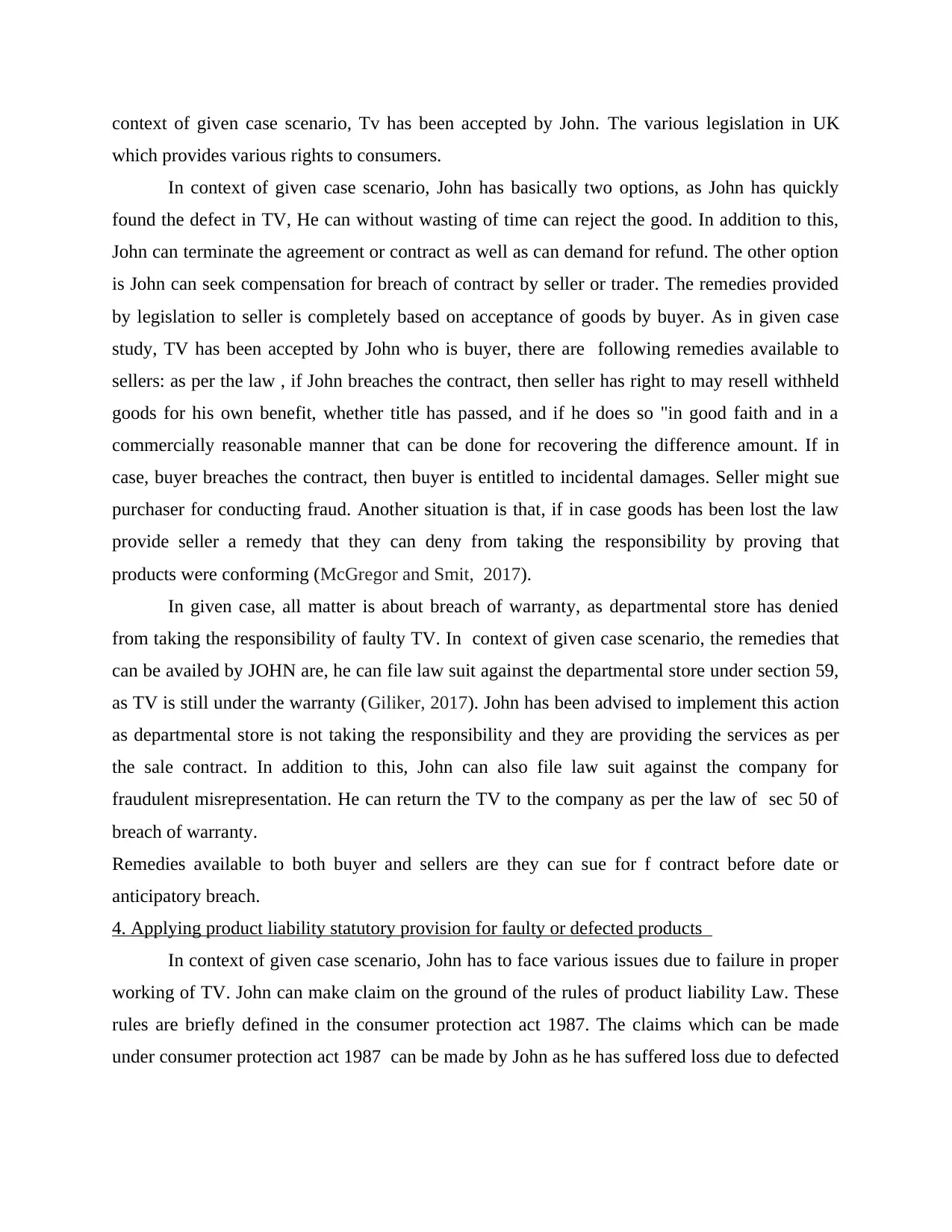
context of given case scenario, Tv has been accepted by John. The various legislation in UK
which provides various rights to consumers.
In context of given case scenario, John has basically two options, as John has quickly
found the defect in TV, He can without wasting of time can reject the good. In addition to this,
John can terminate the agreement or contract as well as can demand for refund. The other option
is John can seek compensation for breach of contract by seller or trader. The remedies provided
by legislation to seller is completely based on acceptance of goods by buyer. As in given case
study, TV has been accepted by John who is buyer, there are following remedies available to
sellers: as per the law , if John breaches the contract, then seller has right to may resell withheld
goods for his own benefit, whether title has passed, and if he does so "in good faith and in a
commercially reasonable manner that can be done for recovering the difference amount. If in
case, buyer breaches the contract, then buyer is entitled to incidental damages. Seller might sue
purchaser for conducting fraud. Another situation is that, if in case goods has been lost the law
provide seller a remedy that they can deny from taking the responsibility by proving that
products were conforming (McGregor and Smit, 2017).
In given case, all matter is about breach of warranty, as departmental store has denied
from taking the responsibility of faulty TV. In context of given case scenario, the remedies that
can be availed by JOHN are, he can file law suit against the departmental store under section 59,
as TV is still under the warranty (Giliker, 2017). John has been advised to implement this action
as departmental store is not taking the responsibility and they are providing the services as per
the sale contract. In addition to this, John can also file law suit against the company for
fraudulent misrepresentation. He can return the TV to the company as per the law of sec 50 of
breach of warranty.
Remedies available to both buyer and sellers are they can sue for f contract before date or
anticipatory breach.
4. Applying product liability statutory provision for faulty or defected products
In context of given case scenario, John has to face various issues due to failure in proper
working of TV. John can make claim on the ground of the rules of product liability Law. These
rules are briefly defined in the consumer protection act 1987. The claims which can be made
under consumer protection act 1987 can be made by John as he has suffered loss due to defected
which provides various rights to consumers.
In context of given case scenario, John has basically two options, as John has quickly
found the defect in TV, He can without wasting of time can reject the good. In addition to this,
John can terminate the agreement or contract as well as can demand for refund. The other option
is John can seek compensation for breach of contract by seller or trader. The remedies provided
by legislation to seller is completely based on acceptance of goods by buyer. As in given case
study, TV has been accepted by John who is buyer, there are following remedies available to
sellers: as per the law , if John breaches the contract, then seller has right to may resell withheld
goods for his own benefit, whether title has passed, and if he does so "in good faith and in a
commercially reasonable manner that can be done for recovering the difference amount. If in
case, buyer breaches the contract, then buyer is entitled to incidental damages. Seller might sue
purchaser for conducting fraud. Another situation is that, if in case goods has been lost the law
provide seller a remedy that they can deny from taking the responsibility by proving that
products were conforming (McGregor and Smit, 2017).
In given case, all matter is about breach of warranty, as departmental store has denied
from taking the responsibility of faulty TV. In context of given case scenario, the remedies that
can be availed by JOHN are, he can file law suit against the departmental store under section 59,
as TV is still under the warranty (Giliker, 2017). John has been advised to implement this action
as departmental store is not taking the responsibility and they are providing the services as per
the sale contract. In addition to this, John can also file law suit against the company for
fraudulent misrepresentation. He can return the TV to the company as per the law of sec 50 of
breach of warranty.
Remedies available to both buyer and sellers are they can sue for f contract before date or
anticipatory breach.
4. Applying product liability statutory provision for faulty or defected products
In context of given case scenario, John has to face various issues due to failure in proper
working of TV. John can make claim on the ground of the rules of product liability Law. These
rules are briefly defined in the consumer protection act 1987. The claims which can be made
under consumer protection act 1987 can be made by John as he has suffered loss due to defected
⊘ This is a preview!⊘
Do you want full access?
Subscribe today to unlock all pages.

Trusted by 1+ million students worldwide
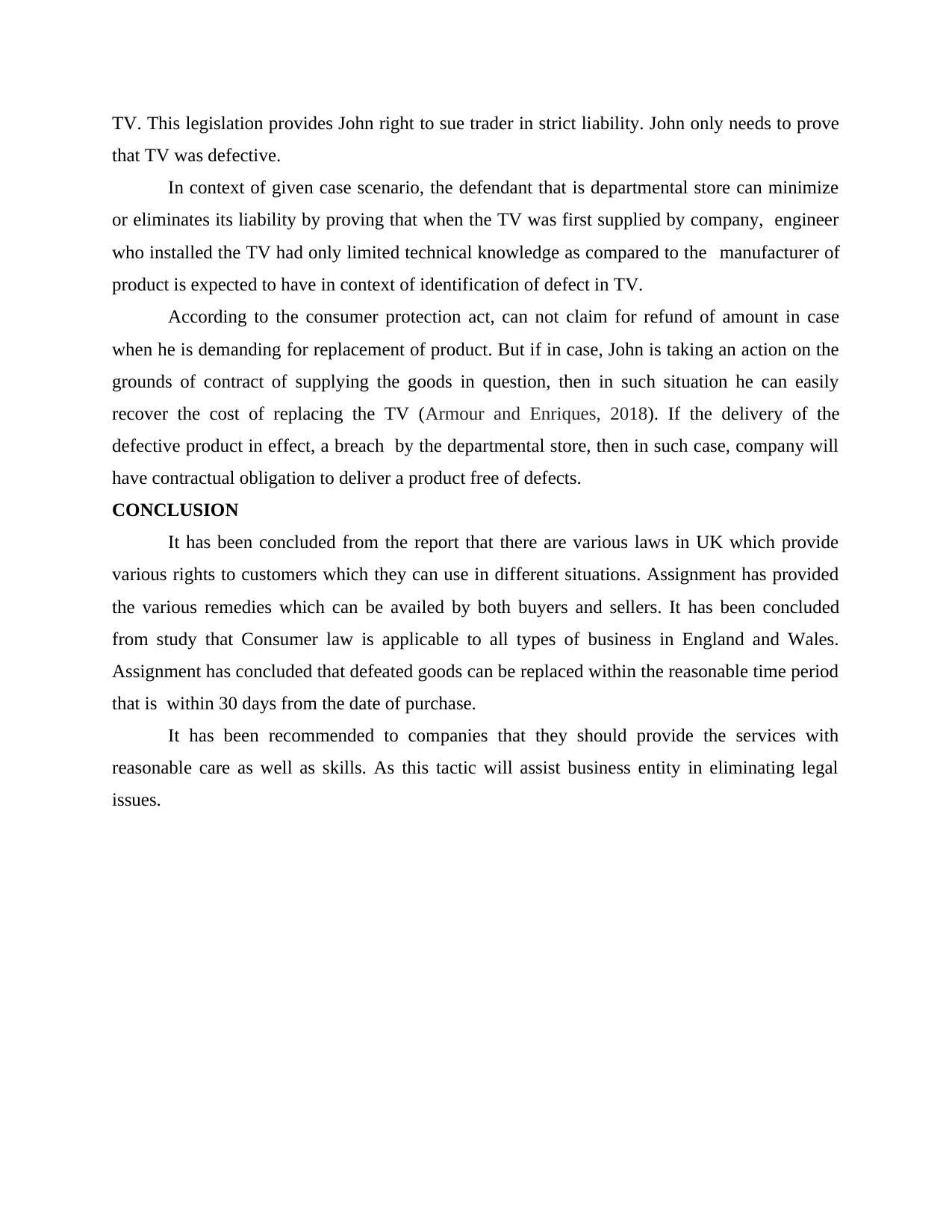
TV. This legislation provides John right to sue trader in strict liability. John only needs to prove
that TV was defective.
In context of given case scenario, the defendant that is departmental store can minimize
or eliminates its liability by proving that when the TV was first supplied by company, engineer
who installed the TV had only limited technical knowledge as compared to the manufacturer of
product is expected to have in context of identification of defect in TV.
According to the consumer protection act, can not claim for refund of amount in case
when he is demanding for replacement of product. But if in case, John is taking an action on the
grounds of contract of supplying the goods in question, then in such situation he can easily
recover the cost of replacing the TV (Armour and Enriques, 2018). If the delivery of the
defective product in effect, a breach by the departmental store, then in such case, company will
have contractual obligation to deliver a product free of defects.
CONCLUSION
It has been concluded from the report that there are various laws in UK which provide
various rights to customers which they can use in different situations. Assignment has provided
the various remedies which can be availed by both buyers and sellers. It has been concluded
from study that Consumer law is applicable to all types of business in England and Wales.
Assignment has concluded that defeated goods can be replaced within the reasonable time period
that is within 30 days from the date of purchase.
It has been recommended to companies that they should provide the services with
reasonable care as well as skills. As this tactic will assist business entity in eliminating legal
issues.
that TV was defective.
In context of given case scenario, the defendant that is departmental store can minimize
or eliminates its liability by proving that when the TV was first supplied by company, engineer
who installed the TV had only limited technical knowledge as compared to the manufacturer of
product is expected to have in context of identification of defect in TV.
According to the consumer protection act, can not claim for refund of amount in case
when he is demanding for replacement of product. But if in case, John is taking an action on the
grounds of contract of supplying the goods in question, then in such situation he can easily
recover the cost of replacing the TV (Armour and Enriques, 2018). If the delivery of the
defective product in effect, a breach by the departmental store, then in such case, company will
have contractual obligation to deliver a product free of defects.
CONCLUSION
It has been concluded from the report that there are various laws in UK which provide
various rights to customers which they can use in different situations. Assignment has provided
the various remedies which can be availed by both buyers and sellers. It has been concluded
from study that Consumer law is applicable to all types of business in England and Wales.
Assignment has concluded that defeated goods can be replaced within the reasonable time period
that is within 30 days from the date of purchase.
It has been recommended to companies that they should provide the services with
reasonable care as well as skills. As this tactic will assist business entity in eliminating legal
issues.
Paraphrase This Document
Need a fresh take? Get an instant paraphrase of this document with our AI Paraphraser
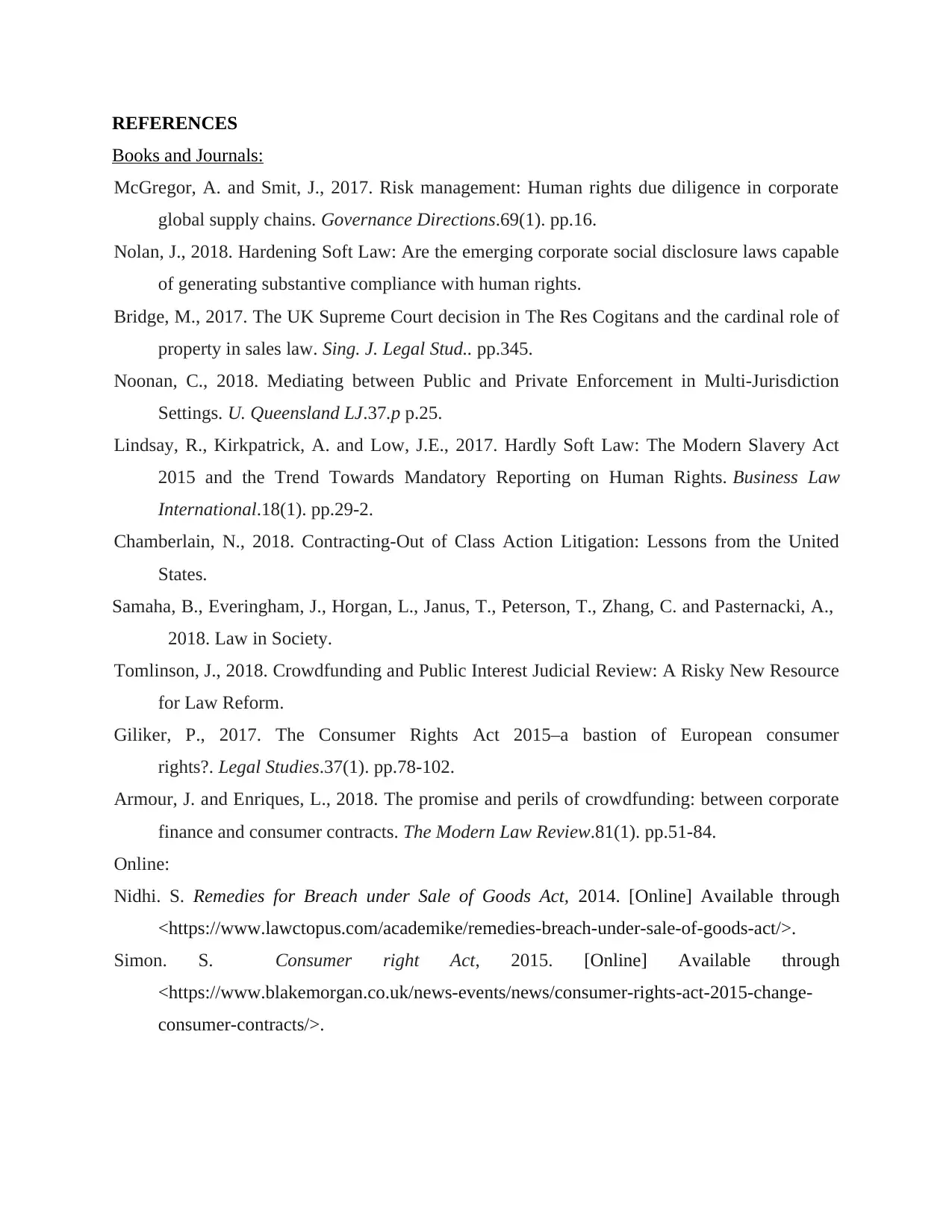
REFERENCES
Books and Journals:
McGregor, A. and Smit, J., 2017. Risk management: Human rights due diligence in corporate
global supply chains. Governance Directions.69(1). pp.16.
Nolan, J., 2018. Hardening Soft Law: Are the emerging corporate social disclosure laws capable
of generating substantive compliance with human rights.
Bridge, M., 2017. The UK Supreme Court decision in The Res Cogitans and the cardinal role of
property in sales law. Sing. J. Legal Stud.. pp.345.
Noonan, C., 2018. Mediating between Public and Private Enforcement in Multi-Jurisdiction
Settings. U. Queensland LJ.37.p p.25.
Lindsay, R., Kirkpatrick, A. and Low, J.E., 2017. Hardly Soft Law: The Modern Slavery Act
2015 and the Trend Towards Mandatory Reporting on Human Rights. Business Law
International.18(1). pp.29-2.
Chamberlain, N., 2018. Contracting-Out of Class Action Litigation: Lessons from the United
States.
Samaha, B., Everingham, J., Horgan, L., Janus, T., Peterson, T., Zhang, C. and Pasternacki, A.,
2018. Law in Society.
Tomlinson, J., 2018. Crowdfunding and Public Interest Judicial Review: A Risky New Resource
for Law Reform.
Giliker, P., 2017. The Consumer Rights Act 2015–a bastion of European consumer
rights?. Legal Studies.37(1). pp.78-102.
Armour, J. and Enriques, L., 2018. The promise and perils of crowdfunding: between corporate
finance and consumer contracts. The Modern Law Review.81(1). pp.51-84.
Online:
Nidhi. S. Remedies for Breach under Sale of Goods Act, 2014. [Online] Available through
<https://www.lawctopus.com/academike/remedies-breach-under-sale-of-goods-act/>.
Simon. S. Consumer right Act, 2015. [Online] Available through
<https://www.blakemorgan.co.uk/news-events/news/consumer-rights-act-2015-change-
consumer-contracts/>.
Books and Journals:
McGregor, A. and Smit, J., 2017. Risk management: Human rights due diligence in corporate
global supply chains. Governance Directions.69(1). pp.16.
Nolan, J., 2018. Hardening Soft Law: Are the emerging corporate social disclosure laws capable
of generating substantive compliance with human rights.
Bridge, M., 2017. The UK Supreme Court decision in The Res Cogitans and the cardinal role of
property in sales law. Sing. J. Legal Stud.. pp.345.
Noonan, C., 2018. Mediating between Public and Private Enforcement in Multi-Jurisdiction
Settings. U. Queensland LJ.37.p p.25.
Lindsay, R., Kirkpatrick, A. and Low, J.E., 2017. Hardly Soft Law: The Modern Slavery Act
2015 and the Trend Towards Mandatory Reporting on Human Rights. Business Law
International.18(1). pp.29-2.
Chamberlain, N., 2018. Contracting-Out of Class Action Litigation: Lessons from the United
States.
Samaha, B., Everingham, J., Horgan, L., Janus, T., Peterson, T., Zhang, C. and Pasternacki, A.,
2018. Law in Society.
Tomlinson, J., 2018. Crowdfunding and Public Interest Judicial Review: A Risky New Resource
for Law Reform.
Giliker, P., 2017. The Consumer Rights Act 2015–a bastion of European consumer
rights?. Legal Studies.37(1). pp.78-102.
Armour, J. and Enriques, L., 2018. The promise and perils of crowdfunding: between corporate
finance and consumer contracts. The Modern Law Review.81(1). pp.51-84.
Online:
Nidhi. S. Remedies for Breach under Sale of Goods Act, 2014. [Online] Available through
<https://www.lawctopus.com/academike/remedies-breach-under-sale-of-goods-act/>.
Simon. S. Consumer right Act, 2015. [Online] Available through
<https://www.blakemorgan.co.uk/news-events/news/consumer-rights-act-2015-change-
consumer-contracts/>.
1 out of 8
Related Documents
Your All-in-One AI-Powered Toolkit for Academic Success.
+13062052269
info@desklib.com
Available 24*7 on WhatsApp / Email
![[object Object]](/_next/static/media/star-bottom.7253800d.svg)
Unlock your academic potential
Copyright © 2020–2026 A2Z Services. All Rights Reserved. Developed and managed by ZUCOL.





